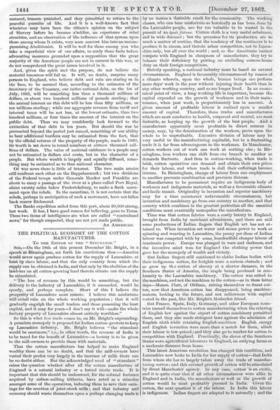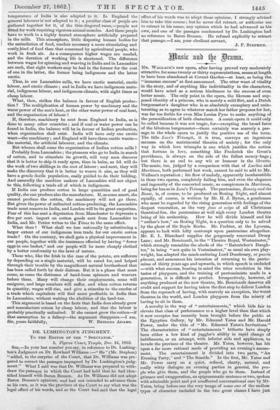THE POLITICAL ECONOMY OF THE COTTON MANUFACTURES.
To THE EDITOR OF THE "SPECTATOR."
Sut,—On the 18th of this present December Mr. Bright, in a speech at Birmingham, set forth his convictions thus :—America would never again produce cotton for the supply of Lancashire, at least by slave labour, and that the only country from which the supply can be obtained is India, and that only by the abolition of the land-tax on all cotton-growing land therein situate can the supply be stimulated.
"The loss of revenue by this would be something, but the delivery to the industry of Lancashire, if it succeeded, would be speedy, and perhaps complete. Short of this I believe the prosperity of Lancashire most remote. I believe this misfortune will entail ruin on the whole working population ; that it will gradually engulph the small traders and those possessing the least capital, and it may for years—I don't say it will—make the whole factory property of Lancashire almost entirely worthless."
So this is what free trade comes to, on Mr. Bright's expounding. A premium monopoly is proposed for Indian cotton-growers to keep up Lancashire industry. Mr. Bright believes "the stimulant would be enormous," i.e., in other words, the revenue of India is to be taxed for the benefit of Lancashire—a bounty is to be given to the mill-owners to provide them with materials.
That the cotton manufacture has helped to make England wealthy there can be no doubt, and that the mill-owners have vested their profits very largely in the increase of mills there can be no doubt either. But the acknowledged need of " stimulant " raises the question whether after all the cotton manufacture of England is a natural industry or a forced exotic trade. It is important that this should be understood, for the colossal fortunes acquired by cotton-miffing hitherto, have acted as a stimulus amongst some of the operatives, inducing them to save their earn- ings for the erection of joint-stock mills ; and that industry and economy should waste themselves upon a perhaps changing trade is
by no means a desirable result for the community. The working classes, who can bear misfortune so heroically as has been done by the Lancashire people, are far too valuable to be wasted in the pursuit of an ignis fatuus. Cotton cloth is a very useful substance, and in wide demand ; but the processes for its production are so much a matter of routine, that the tendency of the routineera is to produce it in excess, and therein arises competition, not in Lanca- shire only, but all over the world ; and, as the Americans earshot compete with England in cheapness of manufacture, they try to balance their deficiency by putting an excluding custom-house duty on their foreign competitors.
Strictly speaking, a national industry must be based on natural circumstances. England is favourably circumstanced by reason of a climate wherein, upon the whole, human beings can perform more days' work in the year without injuring their health than in any other working country, and so are longer lived. In an econo- mical point of view, a long working life is important, because the capital expended on the growth of workmen and in their main- tenance, when past work, is proportionately less in amount. A given amount of profitable labour is realized upon a smaller amount of capital. Therefore, those trades and manufactures which are most conducive to health, corporeal and mental, are most desirable, as keeping up the growth of the best people. And a manufacture apparently most profitable in direct returns in money, may, by the deterioration of the workers, prove upon the whole to be unprofitable. Excessive division of labour may be very useful to the manufacturing capitalist, but in a fluctuating trade it is far from advantageous to the workman. In Manchester, cotton workers out of work can work at nothing else ; in Bir- mingham, iron workers can shift from one branch to another as demands fluctuate. And thus in cotton-working, when trade is brisk, cotton operatives can demand and obtain their own prices for their labour, and when trade is dull their sufferings become_ intense. In Birmingham, change of labour from one employment to another prevents combination and prevents distress.
Manufactures to be permanent require an indigenous body of workmen and indigenous materials, as well as a favourable climate and facile transit. Originality in invention and superior machinery may for a time counteract unfavourable circumstances, but invention and machinery go from one country to another, and that country which combines in the greatest perfection all the essential conditions must eventually monopolize the manufacture.
lime was that cotton fabrics were a costly luxury in England, brought from India by merchant adventurers, and there are still some productions of Indian fingers that English art has not at- tained to. When invention set water and steam power to work at spinning and weaving in Lancashire, the penny per diem of Indian labour was competed with by some, hundredfold cheaper labour of inanimate power. Europe was plunged in wars and darkness, and the inventive mind won for England the clothing power that gave her the monopoly of wealth and victory.
But Indian fingers still continued to clothe Indian bodies with their indigenous cotton, for freights were a serious obstacle ; and so grew up the cotton of slavery at a shorter distance, in the Southern States of America, the staple being produced in con- formity to the Lancashire machinery. The cotton WS suited to the machines, and not the machines to the cotton—as in these latter days—Messrs. Platt, of Oldham, suiting themselves to Surat cot- ton, now that American cotton has disappeared, being machine- makers, looking to the future, and not millowners with capital vested in the past, like Mr. Bright's Methodist friend.
But France, Spain, Italy, Germany, and other European coun- tries turned themselves to cotton manufacturing when the relaxing of English law against the export of cotton machinery permitted them, and they also made stringent laws against the admission of English cloth while retaining English machines. English energy and English invention were more than a match for them, albeit their labour is low-priced ; and they also go to market for cotton in competition with England. Practically, the slaves of the Southern States were agricultural labourers to England, on outlying farms at a moderate distance from home.
This latest American revolution has changed this condition, and Lancashire now looks to India for her supply of cotton—that India from whom she basso largely taken away the trade of manufac- turing cotton ; and this coveted growth of cotton will be stimulated by direct Manchester agency. In any case, cotton is an exotic, and it is quite clear that if all other circumstances were alike in England and in India, the manufacture as well as the growth of cotton would be most profitably pursued in India. Given the cotton, the next question is of the labour. In India this labour is indigenous. Indian fingers are adapted to it naturally ; and the
temperature of India is also adapted to it. In England the general labourer is not adapted to it ; a peculiar class of people are gathered together for it, of the thin-fingered races, —people not fitted for work requiring vigorous anirnal muscles. And these people have to work in a highly heated atmosphere artificially prepared in the mills. This atmosphere, little disposing human bodies for the assimilation of food, renders necessary a more stimulating and costlykind of food than that consumed by agricultural people, who work in fresh air. As a consequence higher wages are needed, and the duration of working life is shortened. The difference between wages for spinning and weaving in India and in Lancashire are such, that eight workers may be had in the former for the cost of one in the latter, the former being indigenous and the latter exotic.
Thus, in our Lanesshire mills, we have exotic material, exotic labour, and exotic climate ; and in India we have indigenous mate- rial, indigenous labour, and indigenous climate, with eight times as cheap labour.
What, then, strikes the balance in favour of English produc- tion? The multiplication of human power by machinery and the water power of the sun's heat, or the other water power of coal heat, and the organization of labour !
If, therefore machinery be sent from England to India, as is done to many other countries ; and if coal or water power can be found in India, the balance will be in favour of Indian production, when organization shall exist. India will have only one exotic want—the machinery; and England will have three exotic wants—. the material, the artificial labourer, and the climate.
But whence shall come the organization of Indian cotton mills ?
Probably from Lancashire ; the pioneers who go to India in search of cotton, and to stimulate its growth, will very soon discover that it is better to ship it ready spun, than in bales, as 3d. will do the work of two shillings in the cost of labour ; and next, they will make the discovery that it is better to weave it also, as they will have a gentle docile population, easily guided to do their bidding. And assuredly the machine makers of Lancashire will not object to this, following a trade all of which is indigenous.
If India can produce cotton in large quantities and of good quality, she can produce also the manufacture. If, as some assert, she cannot produce the cotton, the machinery will not go there. But given the power of unlimited cotton-producing, the Lancashire trade must remove to India, and London will be its great emporium. Fear of this has sent a deputation from Manchester to deprecate a five per cent, import on cotton goods sent from Lancashire to India, and Mr. Potter writes to the Times to the same effect.
What then ? What shall we lose nationally by substituting a larger extent of our indigenous iron trade for our exotic cotton trade? On the contrary, we shall gain a physical improvement in our people, together with the insurance effected by having "fewer eggs in one basket," and our people will be more cheaply clothed by a better conformity to the laws of nature.
Those who, like the Irish in the case of the potato, are sufferers by depending on a single material, will be cared for, and helped through their trouble by the magnificent natural brotherhood that has been called forth by their distress. But it is a phase that must come, as tame the distresses of hand-loom spinners and weavers before them. Many will change their employments, some will emigrate, and large numbers will suffer, and when cotton returns in quantity, wages will rise, and give a stimulus to the exodus of a trade which capitalists will find more profitable in India than in Lancashire, without waiting the abolition of the land-tax.
This argument is based on the facts that India does already grow and manufacture cotton by cheap labour, and that the labour is probably practically -unlimited. If she cannot grow the cotton—if that assumption be a fallacy—the argument disappears.—I am,































 Previous page
Previous page